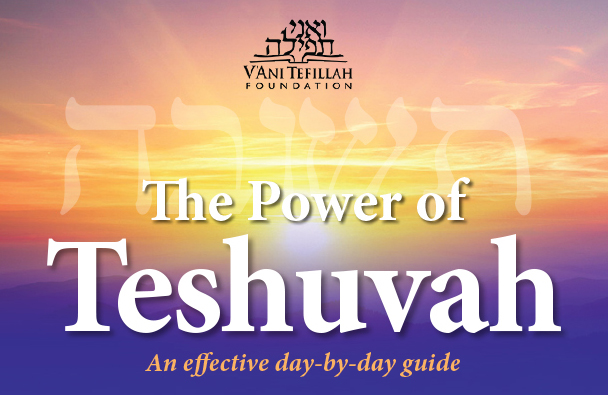The Power of Teshuvah – Day 9

Day 9
Reconnecting
A child goes shopping with his father. While the father selects fruit for Shabbos, the child spies the candy aisle and happily wanders away. As soon as the father finds his son missing, he begins searching the store. The boy, however, is oblivious as he contemplates the beckoning sour sticks and lollipops.
Soon, he tires and thinks about hopping into his car seat and snoozing as his father drives home. His father! Where is he? Suddenly, the child can think of nothing else. He’s lost and alone … and then, he sees his father peering down the aisle in search of him. He runs into his father’s arms crying, “Daddy! I found you!”
Like this little boy, we tend to wander away from our Father in pursuit of our hearts’ desires. For many of us, this defines our day-to-day life. How, then, can we rise to the level of teshuvah mei’ahavah and reconnect with Hashem in the brief period between Rosh Chodesh Elul and Yom Kippur?
As in the allegory of the little boy, as soon as we realize our total dependence on God in every aspect of our daily lives, we are overcome with longing. The sins themselves generate the sense of separation, which in turn spurs a reconnection so passionate that the one who does teshuvah is said to reach a level where “even the righteous do not stand.”
One Yom Kippur a Jewish shepherd boy went to shul. Moved to tears by the solemnity and heartfelt prayers, he asked what was happening. He was told that on this day God sits on His throne and seals the judgment of the world. The boy yearned to join in the prayers. However, he knew not one single word of Hebrew.
Determined to give Hashem the best he could offer, he began to whistle the tune he used to gather his flock from the fields. The other congregants were aghast at his lack of decorum, but the Baal Shem Tov silenced their scolding.
“Until now,” he said, “I felt our prayers being blocked as they tried to reach the heavenly court. This young shepherd’s tears and whistling broke through the barrier … since it was sincere and pure and is an expression of his love for Hashem that came from the depths of his heart.”
The Talmud teaches that after the destruction of the Temple, “all the gates (through which prayers travel) were closed, except for the Gates of Tears.” When our tears represent the purest of our thoughts and longing, those tears move worlds.
When with feeling we cry like children — Our Father, merciful Father, Who acts mercifully, have mercy upon us … — the mere act of desiring to come closer to Hashem merits His help. Hashem then instills the “light of teshuvah” into our hearts, launching our climb toward teshuvah.
Tears of regret and embarrassment are so powerful when they arise from the recognition that our relationship with Hashem is indispensable. One must truly believe that all he has is from Hashem, that his health, livelihood, shidduchim, etc. are entirely in Hashem’s hands, that in this era of total helplessness and decay we must place our faith on Avinu shebaShamayim, our Father in Heaven. When that realization strikes us, it ignites in our soul the spark to do teshuvah. Thus, even the first stirrings of teshuvah in our hearts merit siyata d’Shmaya, enabling us to reconnect.
Points to Ponder:
-
-
- Our sins generate a separation from Hashem.
- The feeling of separation leads to a strong longing to reconnect.
- Hashem helps those who long to return to Him.
-

